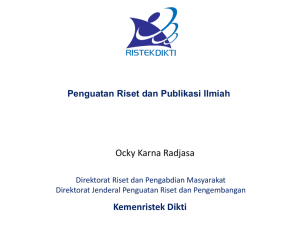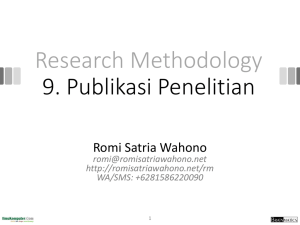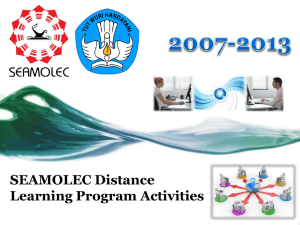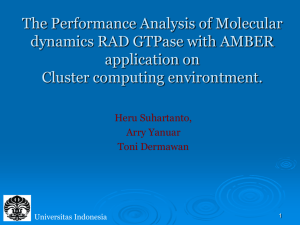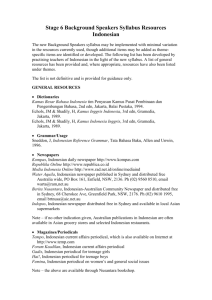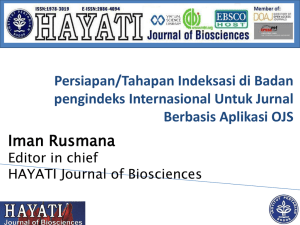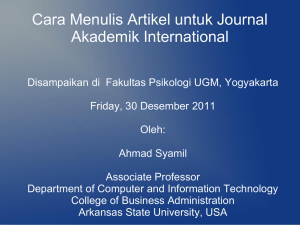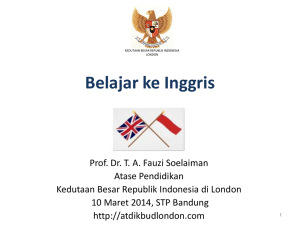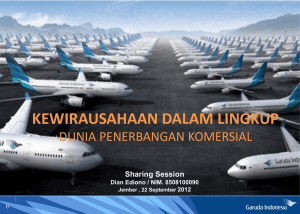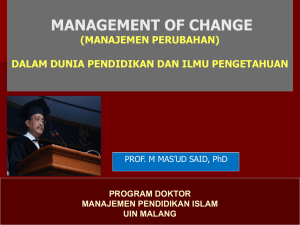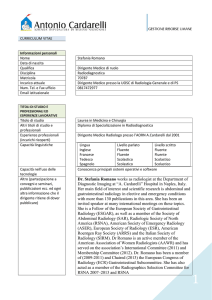e-journal - Perpustakaan
advertisement
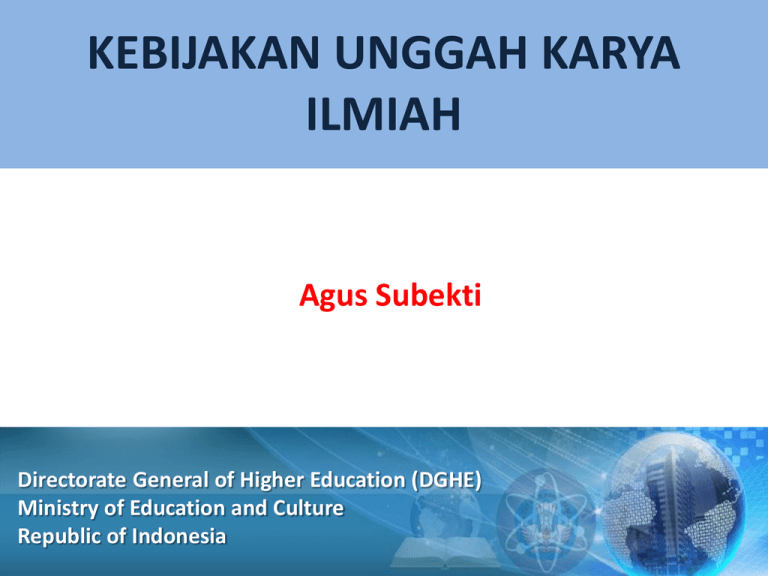
KEBIJAKAN UNGGAH KARYA ILMIAH Agus Subekti Directorate General of Higher Education (DGHE) Ministry of Education and Culture Republic of Indonesia Kebijakan 1. Dirjen Dikti tidak akan melakukan penilaian karya ilmiah yang dipublikasikan di suatu jurnal jika artikel dan identitas jurnal ybs tidak bisa ditelusuri secara online. Kebijakan 2. Kebijakan nomor 1 di atas, efektif diimplementasikan untuk usulan kenaikan pangkat dan jabatan dosen mulai tahun 2012 Kebijakan 3. Perguruan Tinggi dan pengelola jurnal wajib menggunggah karya ilmiah mahasiswa dan dosen pada portal Garuda, portal Perguruan Tinggi, portal jurnal ybs atau portal lainnya. Core Business Higher Education Institution Education, Research, and Community Services Universal Parameter (SNP/Global) Intellectual Higher Education Products Strategic Plan World Class University Implementation Internationally Competitive Tabel Kriteria Penilaian SJTU Criteria Quality of Education Quality of Faculty Indicator Weight Alumni of an institution winning Nobel Prizes and Fields Medals 10% Staff of an institution winning Nobel Prizes and Fields Medals 20% Highly cited researchers in 21 broad subject categories 20% Research Output Articles published in Nature and Science* Articles indexed in Science Citation Indexexpanded, and Social Science Citation Index 20% Per Capita Performance Per capita academic performance of an institution 10% 20% TABEL KRITERIA PENILAIAN THES CRITERIA Institutional characteristics INDICATOR WEIGHT Percentage of INTERNATIONAL STAFF 5% FACULTY to STUDENT ratio 20% Research Number of CITATION FOR ACADEMIC PAPERS generated by each staff member 20% Student characteristics Percentage of INTERNATIONAL STUDENT 5% Review PEER REVIEW score RECRUITER REVIEW score (graduate employers) 40% 10% Webometric (Web Base) CRITERIA INDICATOR WEIGHT Visibility seberapa sering diakses oleh pihak lain (50%) Size jumlah muatan/halaman/ kolom/entri jumlah files yang dimuat (misal bahan ajar, dokumen perpustakaan digital) publikasi ilmiah dosen/staf akademik (20%) Rich files Scholar (15%) (15%) Documents: Number of documents published (country's scientific output) during the selected year. Country Rangking Rank 1 2 3 4 5 6 7 8 9 10 41 42 43 47 48 63 64 70 78 238 Country United States China United Kingdom Japan Germany France Canada Italy Spain India Egypt Malaysia Thailand Pakistan Saudi Arabia Indonesia Bangladesh Philippines Sri Lanka Tokelau Documents 6149455 2248278 1711878 1604017 1581429 1141005 885197 851692 665977 634472 75610 75530 69637 47443 46167 16139 16074 11,326 7019 1 Citable documents 5738593 2226529 1550373 1563732 1490140 1073718 836836 803004 623236 602868 73968 73737 67274 45401 44089 15779 15648 10,979 6619 1 Citations Self-Citations 114546415 9288789 27919060 18441796 23229085 16068688 13928114 11279167 7640544 3860494 438912 281619 528969 197718 241843 125845 97045 121,390 52092 32 54226872 5014506 6703673 5520032 6171727 3749874 2727913 2639721 1958835 1335686 91957 69529 93304 59213 35926 13719 18846 13,857 5455 0 Citations per H index Document 20.51 1305 6 353 18.03 802 12.09 602 16.19 704 15.58 646 18.19 621 15 550 13.66 448 7.71 281 7.23 122 7.64 116 10.66 156 5.9 101 6.82 114 10.85 103 8.01 89 12.95 107 9.77 78 32 1 SCImago. (2007). SJR — SCImago Journal & Country Rank. Retrieved November 04, 2012, from http://www.scimagojr.com Percentage of documents with more than one country (International Collaboration) Indonesian Journals Profile Registered (ISSN) 18.000 Scientific Journals 7.000 Regularly Publish 2.000 Nationally Accredited 500 Published Online 500 Daftar PTN yang Online telah memiliki E-Juornal Indonesian Journals No. 1 2 3 4 5 6 7 8 9 10 11 12 13 14 15 16 17 18 19 20 21 22 23 24 25 26 27 Nama Perguruan Tinggi Universitas Diponegoro Universitas Sam Ratulangi Universitas Sriwijaya Universitas Udayana Universitas Sumatera Utara Institut Teknologi Sepuluh Nopember Institut Teknologi Bandung Institut Pertanian Bogor Politeknik Negeri Padang Universitas Indonesia Universitas Negeri Malang Universitas Airlangga Universitas Andalas Universitas Lampung Universitas Negeri Semarang Universitas Padjadjaran Universitas Negeri Yogyakarta Politeknik Negeri Sriwijaya Universitas Brawijaya Universitas Gadjah Mada Universitas Negeri Surabaya Universitas Negeri Medan Universitas Tadulako Universitas Pendidikan Indonesia Universitas Jenderal Soedirman Universitas Negeri Makassar Politeknik Negeri Medan Alamat OJS http://ejournal.undip.ac.id/ http://ejournal.unsrat.ac.id/ http://ejournal.unsri.ac.id/ http://ejournal.unud.ac.id/ http://ejournal.usu.ac.id/ http://ejurnal.its.ac.id/ http://itb.ac.id/research/journal http://journal.ipb.ac.id/ http://journal.polinpdg.ac.id http://journal.ui.ac.id/ http://journal.um.ac.id/ http://journal.unair.ac.id/ http://journal.unand.ac.id/ http://journal.unila.ac.id/ http://journal.unnes.ac.id/ http://journal.unpad.ac.id/ http://journal.uny.ac.id/ http://jurnal.polsri.ac.id/ http://jurnal.ub.ac.id/ http://jurnal.ugm.ac.id/ http://jurnal.unesa.ac.id/ http://jurnal.unimed.ac.id/ http://jurnal.untad.ac.id/jurnal/ http://jurnal.upi.edu/ http://jurnalonline.unsoed.ac.id/ http://ojs.unm.ac.id/ http://polmed.ac.id/jurnal/ The number of Indonesian scientific journals according to year of the first publication 1980-1989 5% 1960-1969 1% 1970-1979 2% 1950-1959 0% 1940-1949 0% 19101919 0% 1990-1999 21% 2000-2010 71% Indonesian Journals Profile Kenapa publikasi kita rendah? Tulisan ilmiah kita di jurnal nasional kurang visibel dan tidak mudah diakses Kenapa tidak mudah diakses? Baru sebagian kecil jurnal nasional yang tersedia secara on-line Tidak sekedar “on-line” tetapi perlu dikelola layaknya “e-journal” UPAYA CERDAS Peningkatan visibilitas jurnal Indonesia dengan menerapkan “e-journal” dapat terindeks oleh Thomson, Scopus, google dst. Perlu penerapan DOI Peningkatan interoperablitas (saling membaca data) terbitan ilmiah Indonesia Revitalisasi ISJD (Indonesian Scientific journal Database) dan Garuda (Garba Rujukan Digital) Pengelolaan bersama “ICI” (Indonesian Citation Indexs) “E-Journal” • Semua tahapan pengelolaan naskah dengan menggunakan fasilitas “on-line” • Setiap artikel dapat dengan mudah dilacak memiliki indexing system (memiliki Digital Oobject Indentifier - DOI) http://isjd.pdii.lipi.go.id/ Indonesian Digital Reference Portal Directorate General of Higher Education (DGHE) Ministry of Education and Culture Republic of Indonesia http://garuda.dikti go.id Outline About GARUDA (Garba Rujukan Digital) Background Aim Target/Objective Contents Benefit GARUDA is Indonesian Scientific and Public References Portal, managed by DGHEI (Directorate General of Higher Education of Indonesia) Ministry of Education and Culture The Republic of Indonesia Background Source of information is not easily accessible due to scattered locations There is no agreement in the management of information in Indonesia, especially information in digital format Aims 1. To develop technical interoperability Standardization of communication, scanning, storage, and presentation of digital data 2 To establish semantic interoperability Standardization indexing and retrieval 3. To create Political/human interoperability Decision of sharing and cooperating 4. To create Intercommunity interoperability Agreement to cooperate inter-institution, inter-community from various disciplines 5. To construct legal interoperability Regulations and legislation on accessing digital collections, including intellectual property rights 6. To attempt International interoperability Standardization for international cooperation Specific Aim To manage publication of science, technology and art electronically using a portal To build a digital library network To enhance visibility of Indonesian local content richness at international level To formulate agreements, regulations, policies, legislation related on access rights, data security, intellectual property, copyright and plagiarism Objetives To improve citation index and scientific contribution of Indonesian scientists and researchers To improve world ranking of Indonesian Higher Education To improve nation competitiveness Benefits for User to improve quality of scientific publication To prevent duplication of research To expose knowledge development in Indonesia Benefits for contributors To promote their instutions To expanding access for institutions and their work To improve Citation/Indexing/auto indexed at google scholar Content Thesis journals or articles Proceeding Teaching materials Patent Scientific Papers Others Management, Metadata Harvesting and User Access Metadata Delivery Mechanism; using protocol OAI PMH (Open Archive Initiative Protocol for Matedata Harvesting) Contributors : Universities, National and Public Libraries, Research Institutes, Government and NGO. http://garuda.dikti.go.id INHERENT /JARDIKNAS User (username and password not required) Coordinator DP2M-Dikti Kemendikbud Guide for Contributors Contributors should have collection of local content with standard metadata Data should periodically uploaded Contributors should have facilities for hosting and mirroring Metadata Format • • • • • • • • Title Creator Subject Description Publisher Contributor Date Type (Material) • Identifier • Rights = = = = = = = = Title Author Subject and keyword Abstract Instution name of contributor [adviser, promotor, ilustrator, etc.] Year of published [articles, thesis, papaers, proceeding, patent, etc.) = URL Address of contributor institution,] = [Example: CCL, MIT, Open Document, etc.] Achievements 2.275.456 hits since October 2009 with average 12.309ontributor hits/day 316 contributors 513.130 articles 513130 504374 494889 500000 450000 400000 Artikel Abstrak Permalink Aplikasi e-journal Publikasi Hasil PKM dan Pimnas E-Journal PKM-AI E- Proceeding PIMNAS
